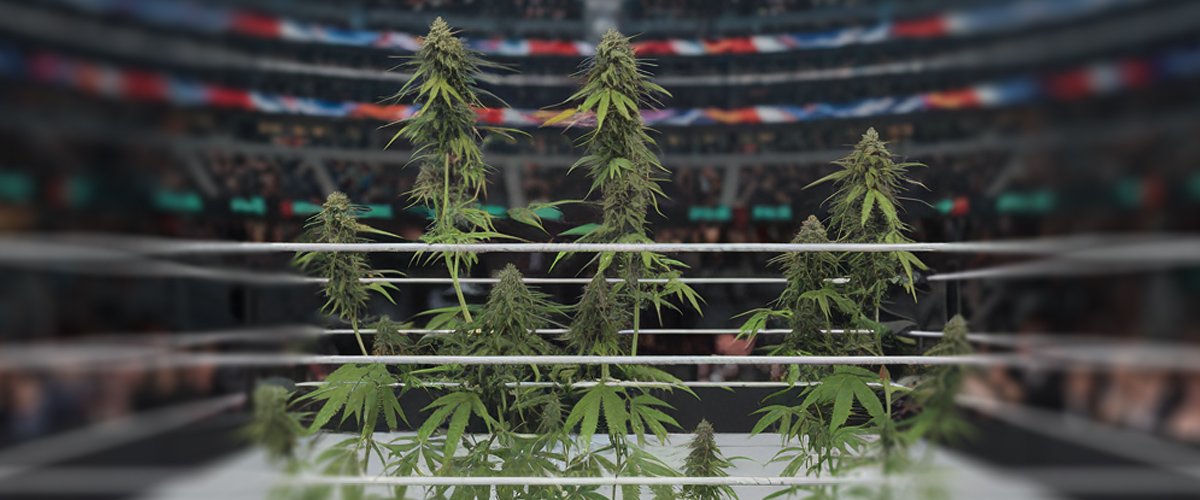In the past, WWE had a strict zero-tolerance policy towards cannabis use among its talent. Disciplinary action, including suspension and terminations, would be taken against any wrestler found to be using marijuana. Now, cannabis is confirmed to no longer be on WWE’s banned substance list, allowing wrestlers to use it for both medicinal and recreational purposes.
Brief History Of WWE’s Stance On Cannabis Usage
Arrests for marijuana-related offenses hampered the careers of several wrestlers. Notably, The Iron Sheik and Hacksaw Jim Duggan, for instance. Their 1987 arrest resulted in temporary firings and exposed the eventual strictness of WWE’s cannabis regulations.
A protocol of drug testing was instituted by WWE in 1991. Anabolic steroids and similar performance-enhancing substances were the only ones originally covered under this regulation. However, as time went on, the policy expanded to include other substances, including marijuana. But eventually, the policy expanded to include other drugs, including marijuana. World Wrestling Entertainment (WWE) maintained its policy of testing for marijuana use all the way into the 2000s.
Randy Orton has received several fines for cannabis usage throughout the years. Brian Kendric also racked up a number of fines for failing drug tests for marijuana. In 2006, Rob Van Dam was arrested for possession of cannabis, at the time of holding both WWE & ECW titles. He was suspended and forced to give up his titles. This led to a public outcry, with many claiming that this was too harsh of a punishment, with others saying no punishment was necessary at all. The incident prompted the WWE to reevaluate their drug testing policy and eventually led to a more lenient approach towards marijuana use among their wrestlers.
The WWE updated its policy on drug testing in 2007. A fine and a warning would be given to wrestlers detected using cannabis for the first time, and a suspension would follow any consecutive positive tests. In 2013, there was yet another revision to the policy. The new policy of the WWE, which allows medical marijuana with a valid prescription, reflects the changing legal landscape of cannabis use.
In 2018, the policy underwent another adjustment to address changes in the legislation. As long as the concentration of THC in the oil does not exceed 0.3%, the new guideline permits the use of cannabidiol (CBD), a non-psychoactive component of marijuana. Wrestlers face disciplinary consequences in the event that they test positive for THC, while recreational marijuana usage remains illegal. The use of cannabis for recreational purposes remained illegal, and wrestlers faced disciplinary measures in the event that they tested positive for THC.
Now, the WWE cannabis policy has been amended again, and recreational marijuana is now allowed within the WWE. While the company hasn’t publicly announced this, WWE star Michin confirmed in an interview that wrestlers are now allowed to use recreational cannabis in their personal time. This change reflects evolving attitudes towards cannabis use in society and within the professional wrestling industry.
WWE Star Confirms Cannabis Is No Longer On Banned Substances List
WWE past stance on cannabis has since softened, with a more relaxed approach to marijuana use among its talent. During an appearance on THE SPEAKEEZY podcast, WWE star Michin confirmed WWE has removed cannabis from its banned list after accepting many state legislations and that many wrestlers consume it. “Because it’s more legal, they’ve kind of accepted it.” Michin said.
The shift in policy reflects a changing attitude towards marijuana use in the wrestling industry, as more research emerges about its potential benefits for pain management and overall wellness. When asked if she partakes in cannabis consumption, Michin states, “When I get home on Saturdays, I’ll do that and just chill out all day, and then I get back into the gym on Sunday. Sunday through Wednesday, I work out.”
The WWE cannabis policy shift could potentially lead to a more open and accepting environment for wrestlers who choose to use cannabis for medicinal purposes. It also highlights a shift towards a more holistic approach to health and wellness within the industry. Michin’s candid admission about her own cannabis use may encourage other athletes to be more open about their own practices and potentially lead to more discussions about the benefits and risks associated with marijuana use in sports and entertainment.
WWE Has Now Decided To Allow Cannabis Use
Historically, WWE had a strict anti-drug policy. However, as societal attitudes towards cannabis have evolved, WWE has become more open to discussing potential changes to their policies regarding cannabis usage and its athletes. WWE’s decision to allow cannabis use represents a step towards destigmatizing the plant and promoting a more inclusive environment for athletes.
By sharing her personal experience, Michin is contributing to the dismantling of barriers and initiating crucial discussions about the convergence of cannabis, health, and sports. It is clear that the industry is evolving towards a more progressive and understanding approach to wellness, paving the way for a more enlightened future in sports and entertainment.



